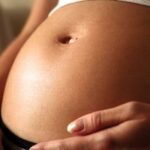Keeping your body healthy and your immune system functioning is important all the time but when you are pregnant you are not only caring for your own body but your unborn child’s as well. Eating a well balanced diet full of helpful nutrients is the best way to obtain what you need but many times it may be necessary to supplement with a vitamin. During pregnancy prenatal vitamins are adequate to keep your body healthy and below I will describe several of the important nutrients needed.
Vitamin A is important for growth and proper development of the eyes and skin. Birth defects have been connected with vitamin A deficiency so this is most definitely a necessary nutrient. It’s recommended to include up to 5000 I.U. of vitamin A during pregnancy as opposed to only 1000 when not pregnant. While nursing around 6000 is a good amount. The more pollutants and pesticides you are exposed to, the more vitamin A that is necessary. It’s important to note that vitamin A is stored in your liver so if you are able to intake a lot one day, you can get by with less for the next few days.
In fruits and vegetables vitamin A is also referred to as carotene or provitamin A. Exposure to air can destroy the benefits of carotene so juices should be consumed soon after preparation. It’s also important to chew foods high in carotene thoroughly to absorb adequate amounts of vitamin A. If you take vitamin E at the same time as vitamin A you will get more benefits of the carotene, this will help to keep the vitamin from being destroyed by oxygen. If taking a vitamin A supplement, it’s helpful to do so with a meal or a glass of milk, something with fat. Fats stimulate the digestive system and help your body absorb the vitamin. Vitamin A supplements are made with fish liver oils and can be bought at your local drugstore.
The following foods are high in vitamin A and are natural sources of the nutrient:
Spinach, mango, kale, winter squash, beef liver, pumpkin, papaya, apricots, and cantaloupe.
Vitamin B is another important nutrient during pregnancy because the 12 components of the vitamin (B complex) are the building blocks of cellular growth and development. Lack of the B vitamin can result in nervousness, depression, weakness, anemia, constipation and loss of hunger. It’s an essential vitamin to take whenever you are feeling stressed. Vitamin B supplements are best taken as a combination, such as b6, b12 or B complex. They combination works together and getting too much of one vitamin B factor by itself can throw the body off balance. White sugar depletes the body’s use of vitamin B so it should be avoided or limited to increase the body’s storage of the vitamin. Alcohol also destroys the B vitamins. Vitamin B is water soluble so it’s better to steam vegetables then to boil them and toss the water, you will be missing out on valuable nutrients.
Deficiency in B6 vitamin can result in nausea and vomiting, lack of energy, leg cramps, irritability, anemia and insomnia. It’s best to get an intake of 2.6 mg. per day during pregnancy and while nursing. Foods rich in vitamin B6 include: Bananas, watermelon, beans, broccoli, brussel sprouts, peas, avocado, corn, whole wheat flour, brown rice, peanuts, liver and chicken.
Folic acid is very much an essential nutrient during pregnancy, Lack of it has resulted in birth defects, premature birth, toxemia, placenta detaching too soon, hemorrhaging and sometimes anemia. All women, especially during childbearing years should be getting enough folic acid in their diet or supplementing to make sure. During pregnancy the need for folic acid doubles from .4 mg. to .8 mg. Supplements are almost always recommended in addition to eating foods high in folic acid. Vitamin C is necessary for adequate absorption of vitamin B. Foods high in vitamin folic Acid include: spinach, fresh orange juice, brussel sprouts, soybeans, garbanzo beans, and Romaine lettuce.
Vitamin C is always an essential nutrient and most definitely during pregnancy as it’s a time of stress on the body. Vitamin C helps boost the immune system among other things. 80 mg. is a good amount of vitamin C to take during pregnancy. Many women benefit from taking larger amounts, 500-1000 mg a day and even more so during sickness. Foods high in Vitamin C include: oranges, grapefruit, lemons, limes, strawberries, broccoli, brussel sprouts, cabbage, cauliflower, kale, okra, spinach, tomatoes, and lima beans.
Vitamin D is necessary to assist calcium absorption and bone formation. During pregnancy and lactation the recommended amount doubles to 10 mcg. Deficiency in this vitamin can mean your child develops weak bones, poor teeth, loss of muscle tone, rickets or overall poor growth and development. Sun helps the body obtain vitamin D as does vitamin fortified milk. Vitamin D supplements may also be necessary to make sure your body is getting an adequate amount of this nutrient. Vitamin A and D supplements are available at your local drug store and are made with fish liver oil. Other sources include egg yolks, mushrooms, cashew nuts and soaking up some rays of sun.
Vitamin E is another essential vitamin during pregnancy. The recommended amount is about 10 mg. per day during pregnancy and lactation. If you eat whole grain and unrefined foods you may be getting enough vitamin E but if not a supplement is necessary.
Vitamin K is another necessity during pregnancy but the recommended amount does not change. Vitamin K is necessary for proper blood clotting. Deficiency can cause miscarriage, hemorrhaging after childbirth. Vitamin K is hindered by antibiotics, mineral oil, aspirin and radiation. These instances may require an increase in the vitamin. Good sources of vitamin K include dark green leafy vegetables, and tomatoes.
Calcium is essential for healthy bones. During pregnancy the recommended dosage jumps up to 1200 mg per day. Inadequate amounts of calcium can result in osteoporosis, headaches, leg cramps, insomnia, spasms and lower pain tolerance. Foods high in calcium include: almonds, cheese, milk, green vegetables, tofu and soybeans.
Iron is highly important for all women but is an even more essential nutrient during pregnancy. During pregnancy the fetus takes about a third of the mother’s iron to help form their blood. Another thing is that a pregnant women’s body increases it’s own blood flow 25-50%. Most women do just fine during pregnancy but it’s still important to check your iron levels and to watch for signs of anemia. Normally 18 mg of iron is recommended, however if your blood count is low more may be necessary. Foods high in iron include: Almonds, peanuts, walnuts, dried apricots and peaches, prunes, raisins, beans, liver, tofu and soybeans.
Protein is also important during pregnancy. Protein should account for about 5% of your calorie intake so on average 36 grams per day. It’s best to eat food high in protein but be aware so that you aren’t getting too much. Some foods high in protein include: Legumes, grains and flours, nuts and seeds, vegetables such as broccoli, sweet potatoes, avocados, collard greens, dairy, eggs, tofu, peanut butter, meats and fish.
If you didn’t before, you should watch what you eat and what goes into your body now that you are pregnant. Even better, a healthy lifestyle and diet should be achieved before conception and long after giving birth, especially when breastfeeding. You will feel better and your body and baby will thank you.



